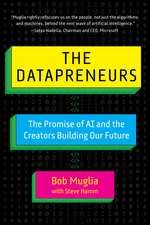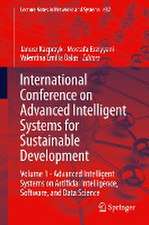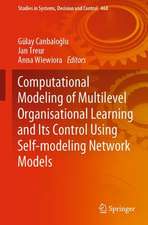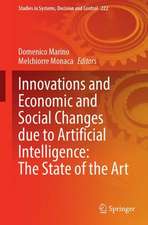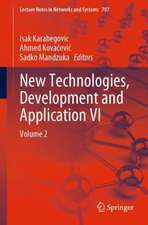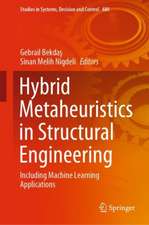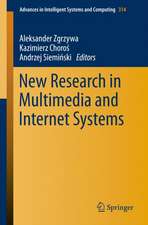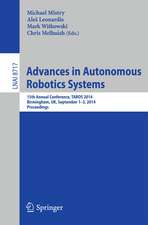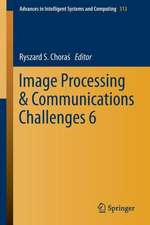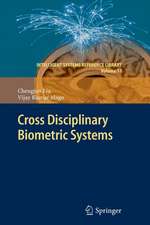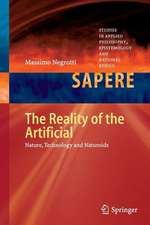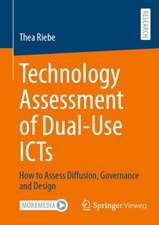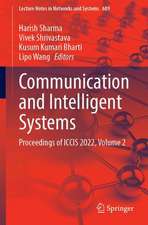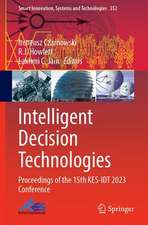Technen: Elements of Recent History of Information Technologies with Epistemological Conclusions: Intelligent Systems Reference Library, cartea 71
Autor Andrzej Piotr Wierzbickien Limba Engleză Hardback – 7 aug 2014
During last fifty years we observed a decomposition of the old episteme (understood as a way of creating and interpreting knowledge characteristic for a given civilization epoch) of modernism, which was an episteme typical for industrial civilization. Today, the world is differently understood by the representativesof three different cultural spheres: of strict and natural sciences; of human and social sciences (especially by their part inclined towards postmodernism) and technical sciences that have a different episteme than even that of strict and natural sciences. Thus, we observe today not two cultures, but three different episteme.
The book consists of four parts. First contains basic epistemological observations, second is devoted to selected elements of recent history of information technologies, third contains more detailed epistemological and general discussions, fourth specifies conclusions. The book is written from the cognitive perspective of technical sciences, with a full awareness – and discussion – of its differences from the cognitive perspective of strict sciences or human and social sciences. The main thesis of the book is that informational revolution will probably lead to a formation of a new episteme.
The book includes discussions of many issues related to such general perspective, such as what is technology proper; what is intuition from a perspective of technology and of evolutionary naturalism; what are the reasons for and how large are the delays between a fundamental invention and its broad social utilization; what is the fundamental logical error (using paradoxes that are not real, only apparent) of the tradition of sceptical philosophy; what are rational foundations and examples of emergence of order out of chaos; whether civilization development based on two positive feedbacks between science, technology and the market might lead inevitably to a self-destruction of human civilization; etc.
| Toate formatele și edițiile | Preț | Express |
|---|---|---|
| Paperback (1) | 647.28 lei 6-8 săpt. | |
| Springer International Publishing – 17 sep 2016 | 647.28 lei 6-8 săpt. | |
| Hardback (1) | 653.56 lei 6-8 săpt. | |
| Springer International Publishing – 7 aug 2014 | 653.56 lei 6-8 săpt. |
Din seria Intelligent Systems Reference Library
- 20%
 Preț: 1050.57 lei
Preț: 1050.57 lei - 20%
 Preț: 1157.60 lei
Preț: 1157.60 lei - 20%
 Preț: 648.44 lei
Preț: 648.44 lei - 20%
 Preț: 650.08 lei
Preț: 650.08 lei - 20%
 Preț: 1005.64 lei
Preț: 1005.64 lei - 5%
 Preț: 968.88 lei
Preț: 968.88 lei - 20%
 Preț: 1052.67 lei
Preț: 1052.67 lei - 20%
 Preț: 1171.46 lei
Preț: 1171.46 lei - 20%
 Preț: 1164.84 lei
Preț: 1164.84 lei - 20%
 Preț: 815.83 lei
Preț: 815.83 lei - 20%
 Preț: 989.96 lei
Preț: 989.96 lei - 20%
 Preț: 1063.41 lei
Preț: 1063.41 lei - 20%
 Preț: 504.37 lei
Preț: 504.37 lei - 18%
 Preț: 1113.26 lei
Preț: 1113.26 lei - 20%
 Preț: 1920.04 lei
Preț: 1920.04 lei - 20%
 Preț: 990.62 lei
Preț: 990.62 lei - 20%
 Preț: 651.57 lei
Preț: 651.57 lei - 20%
 Preț: 645.97 lei
Preț: 645.97 lei - 20%
 Preț: 660.16 lei
Preț: 660.16 lei - 20%
 Preț: 647.13 lei
Preț: 647.13 lei - 20%
 Preț: 654.05 lei
Preț: 654.05 lei - 20%
 Preț: 649.93 lei
Preț: 649.93 lei - 20%
 Preț: 648.11 lei
Preț: 648.11 lei - 20%
 Preț: 657.99 lei
Preț: 657.99 lei - 20%
 Preț: 656.84 lei
Preț: 656.84 lei - 20%
 Preț: 1624.04 lei
Preț: 1624.04 lei - 20%
 Preț: 642.98 lei
Preț: 642.98 lei - 20%
 Preț: 649.60 lei
Preț: 649.60 lei - 20%
 Preț: 651.23 lei
Preț: 651.23 lei - 20%
 Preț: 653.06 lei
Preț: 653.06 lei - 20%
 Preț: 1002.99 lei
Preț: 1002.99 lei - 20%
 Preț: 645.14 lei
Preț: 645.14 lei - 20%
 Preț: 658.33 lei
Preț: 658.33 lei - 20%
 Preț: 644.98 lei
Preț: 644.98 lei - 20%
 Preț: 646.62 lei
Preț: 646.62 lei
Preț: 653.56 lei
Preț vechi: 816.95 lei
-20% Nou
Puncte Express: 980
Preț estimativ în valută:
125.08€ • 129.21$ • 104.09£
125.08€ • 129.21$ • 104.09£
Carte tipărită la comandă
Livrare economică 26 martie-09 aprilie
Preluare comenzi: 021 569.72.76
Specificații
ISBN-13: 9783319090320
ISBN-10: 3319090321
Pagini: 351
Ilustrații: X, 320 p. 30 illus.
Dimensiuni: 155 x 235 x 25 mm
Greutate: 0.64 kg
Ediția:2015
Editura: Springer International Publishing
Colecția Springer
Seria Intelligent Systems Reference Library
Locul publicării:Cham, Switzerland
ISBN-10: 3319090321
Pagini: 351
Ilustrații: X, 320 p. 30 illus.
Dimensiuni: 155 x 235 x 25 mm
Greutate: 0.64 kg
Ediția:2015
Editura: Springer International Publishing
Colecția Springer
Seria Intelligent Systems Reference Library
Locul publicării:Cham, Switzerland
Public țintă
ResearchCuprins
Epistemological Comments.- Elements of Recent History of Information Technologies. Epistemological Conclusions.
Textul de pe ultima copertă
The book expresses the conviction that the art of creating tools – Greek techne – changes its character together with the change of civilization epochs and co-determines such changes. This does not mean that tools typical for a civilization epoch determine it completely, but they change our way of perceiving and interpreting the world. There might have been many such epochs in the history of human civilization (much more than the three waves of agricultural, industrial and information civilization). This is expressed by the title Technen of the book, where n denotes a subsequent civilization epoch.
During last fifty years we observed a decomposition of the old episteme (understood as a way of creating and interpreting knowledge characteristic for a given civilization epoch) of modernism, which was an episteme typical for industrial civilization. Today, the world is differently understood by the representativesof three different cultural spheres: of strict and natural sciences; of human and social sciences (especially by their part inclined towards postmodernism) and technical sciences that have a different episteme than even that of strict and natural sciences. Thus, we observe today not two cultures, but three different episteme.
The book consists of four parts. First contains basic epistemological observations, second is devoted to selected elements of recent history of information technologies, third contains more detailed epistemological and general discussions, fourth specifies conclusions. The book is written from the cognitive perspective of technical sciences, with a full awareness – and discussion – of its differences from the cognitive perspective of strict sciences or human and social sciences. The main thesis of the book is that informational revolution will probably lead to a formation of a new episteme.
The book includes discussions of many issues related to such general perspective, such as what is technology proper; what is intuition from a perspective of technology and of evolutionary naturalism; what are the reasons for and how large are the delays between a fundamental invention and its broad social utilization; what is the fundamental logical error (using paradoxes that are not real, only apparent) of the tradition of sceptical philosophy; what are rational foundations and examples of emergence of order out of chaos; whether civilization development based on two positive feedbacks between science, technology and the market might lead inevitably to a self-destruction of human civilization; etc.
During last fifty years we observed a decomposition of the old episteme (understood as a way of creating and interpreting knowledge characteristic for a given civilization epoch) of modernism, which was an episteme typical for industrial civilization. Today, the world is differently understood by the representativesof three different cultural spheres: of strict and natural sciences; of human and social sciences (especially by their part inclined towards postmodernism) and technical sciences that have a different episteme than even that of strict and natural sciences. Thus, we observe today not two cultures, but three different episteme.
The book consists of four parts. First contains basic epistemological observations, second is devoted to selected elements of recent history of information technologies, third contains more detailed epistemological and general discussions, fourth specifies conclusions. The book is written from the cognitive perspective of technical sciences, with a full awareness – and discussion – of its differences from the cognitive perspective of strict sciences or human and social sciences. The main thesis of the book is that informational revolution will probably lead to a formation of a new episteme.
The book includes discussions of many issues related to such general perspective, such as what is technology proper; what is intuition from a perspective of technology and of evolutionary naturalism; what are the reasons for and how large are the delays between a fundamental invention and its broad social utilization; what is the fundamental logical error (using paradoxes that are not real, only apparent) of the tradition of sceptical philosophy; what are rational foundations and examples of emergence of order out of chaos; whether civilization development based on two positive feedbacks between science, technology and the market might lead inevitably to a self-destruction of human civilization; etc.
Caracteristici
Devoted to the art of constructing tools, Greek techne Demonstrates that the art of creating tools changes its character together with the change of civilization epochs and co-determines such changes The main thesis of the book is that information revolution will probably lead to a formation of a new episteme Includes supplementary material: sn.pub/extras

